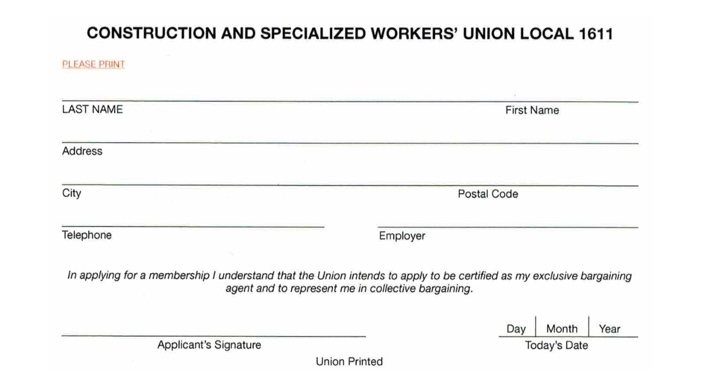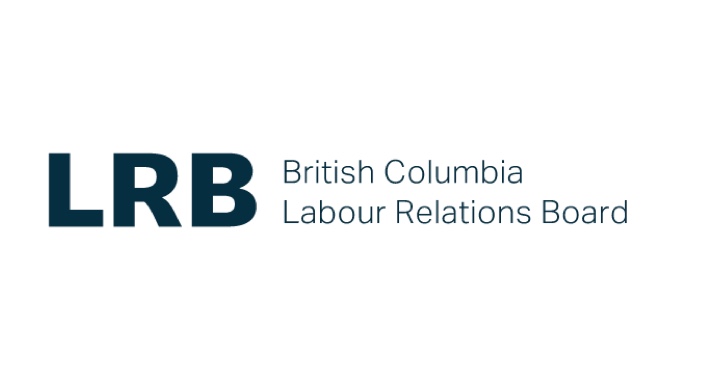Join
LiUNA 1611
Join a union and feel the power at work! LiUNA 1611 members enjoy higher wages, more benefits, stronger job security, and a better work/life balance.
How to form a Union
Forming a union is a worker’s legal right under Canadian Charter of Rights and Freedoms, and there is a legal process that workers must follow to do so. That process looks like this:

Get in touch with an organizer
The first step is to get in touch with a union organizer! Your organizer will work with you on a winning strategy, answer your questions, and address any concerns. Think of them as your all around support throughout the process.

Sign a
union card
A majority of workers must sign a confidential union card to advance the process. Signing a union card is like signing a petition. The more people who sign, the more powerful your demands for change will be.

File for union certification
a) If 45-55% of the workforce have signed on, the Labour Board will conduct an election.
b) If over 55% of the workforce signed up, there is no need for a certification vote, and workers move on to bargaining.

“Lorem ipsum dolor sit amet, consectetur adipiscing elit. Aliquam pretium velit quis massa pulvinar bibendum.”
John Doe
Job @ Workplace

“Lorem ipsum dolor sit amet, consectetur adipiscing elit. Aliquam pretium velit quis massa pulvinar bibendum.”
John Doe
Job @ Workplace

“Lorem ipsum dolor sit amet, consectetur adipiscing elit. Aliquam pretium velit quis massa pulvinar bibendum.”
John Doe
Job @ Workplace
Frequently Asked Questions
The Union Advantage
-
Better Wages & Equal Pay
- Bargaining Power & Representation
- Improved Safety
- Health and Dental Benefits & Retirement Security
- Job Security & Fair Scheduling
On average, unionized workers earned $5.12/hour more than non-union employees. And for women in unions, who are traditionally paid less by non-union corporations, you earn roughly $6.91/hour more. This ensures that all workers doing the same work, regardless of their gender identity, are being paid fairly.
Local 1611 strives to negotiate Collective Agreements that provide a fair wage and guaranteed, pre-negotiated raises. You’ll never have to ask for a raise again, eliminating favouritism and managerial discrimination. This advantage extends: – Youth: Earn $3.16/hour more when you unionize. – Indigenous People: Earn $6.51/hour more when you unionize. – New Immigrants: Earn $3.97/hour more when you unionize.
When workers unionize, they gain the power to negotiate with their employer collectively instead of individually. Collectively you can negotiate better wages, health and retirement benefits, fair work schedules, job security and overall improved workplace conditions.
LiUNA members also have a support network made up of Union Reps, Stewards, WCB Advocates, and Lawyers to help protect and ensure your fair treatment.
Many non-union workers are scared to point out safety concerns in the workplace as they are fearful of discipline or being labelled as troublemakers. This isn’t a concern in unionized workplaces, which is why unionized workplaces are safer.
Unionized workers have a 25% lower rate of injury. With a union, workers can hold their employer accountable for their safety in the workplace without any fear of being punished.
If a LiUNA member does get injured at work, you’ll have access to a WCB Advocate that will help you through the process of getting compensation.
Covered members and their dependents have health benefits such as extended healthcare, dental care, drug coverage, and life insurance. Members can also negotiate a pension plan or RRSP match into their collective agreement, depending on their priorities. These benefits can’t be changed without workers’ approval, unlike in a non-unionized workplace.
Forming a union is a worker’s best way to get job security. Unionizing removes the employer’s ability to terminate workers without just cause and creates a dispute resolution process that promotes a fair and respectful work environment.
On average, unionized workers earned $5.12/hour more than non-union employees. And for women in unions, who are traditionally paid less by non-union corporations, you earn roughly $6.91/hour more. This ensures that all workers doing the same work, regardless of their gender identity, are being paid fairly.
